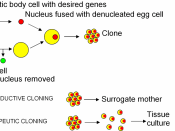A Look Into the Ethical Aspect of Human Cloning With the rapid development of technology in the late twentieth and early twenty-first century cloning has become a serious issue. Technology has allowed us to be able to create clones (exact genetic copies) of various animals and we many are now anxious to began cloning humans. Scientists have successfully cloned rats, sheep, cats and all have gone well so they want to expand the possibilities and attempt to create a clone of another human. Basically, cloning is the process in which DNA of a female egg is replaced with different DNA from another cell. This process is referred to as the Nuclear Transfer or Nuclear Substitution. DNA molecules are the strings of protein that hold genetic coding. In this operation, the nucleus, which is the part of the cell that contains the DNA, are carefully removed from an unfertilized female egg then replaced with the DNA from the cell of another person.
The egg with the DNA from another person is then manipulated into believing it has been fertilized and is implanted into the womb of the mother just as is done in the process of vitro fertilization. The fetus then develops normally. Despite the fact that cloning is so advanced that we can clone just about anything without any problems, it is immoral unethical to do so. We should ban human cloning in the United States because it is immoral, it is not a financial possibility, and isn't a risk worth taking . The most important issues in the cloning debate do not involve the failures, but the effects of its success.
Issues of cloning have been important to people in the past few years because it has become more of an actuality than ever before. Assuming that cloning...


